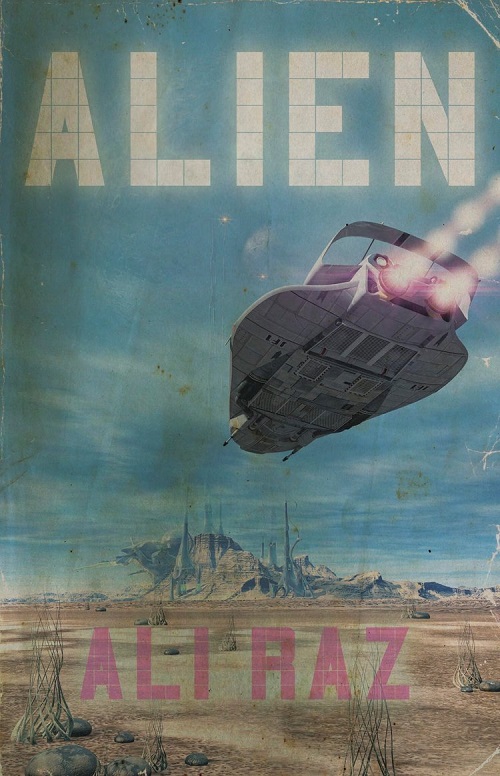
Ali Raz’s newest book, Alien, is a novella about a hunter on the lookout for extraterrestrials in a city facing consistent destruction. For a quick read, it is not without its sharp risks and thrilling angles. In our time of heightened brutality, when friction is omnipresent, Alien hits the unlikely sweet spot of engaging enough to be a relief and caustic enough to express its gravity. Raz deserves credit for showing that one does not have to be sacrificed for another.
Raz’s last book was a collaborative work with Vi Khi Nao called Human Tetris, which provides unique insight into Alien. Where Human Tetris creates stalactites out of the dating pitch by positioning the bodies of text perpendicular to their titles, Alien’s pages are filled with outlined blocks of sentences reminiscent of the tetriminos that compose the namesake video game. Alien’s story is largely told through outlined rectangles and squares. Like the Tetris shapes themselves rotated and then dropped full of story, Raz’s formatting choices make me wonder both how and why more books haven’t utilized this straightforward yet impactful gridding. From another viewpoint, Alien’s text boxes move like missiles falling from the sky, visually akin to playing the game Space Invaders. However, that title’s already been appropriately reclaimed by Nona Fernandez, and rightly so.
But Alien doesn’t only contain these mutated relationships to video games but to movies and comic books as well. Her series of cordoned off lines are arranged in innovative ways that may be more familiar to other media. There’s a stroke of brilliance in Raz writing a graphic novel, sequential outlined words that announce their parcel-like status, without graphics. It calls into question our current survival in the wreckages of modernism and the boxing in of bodies and the earth into modular units to be moved and consumed.
Despite the original stylistic choices that she makes, Alien is remarkably readable. Upon my first dive in, it immediately conjured Alain Robbe-Grillet’s unknown soldier looping around the harsh metropolis in the 1959 novel, In the Labyrinth. This is an apt comparison as Robbe-Grillet also took interesting punches at realism, and his writings maintained a prominent tie to the film image, as Raz’s do. Her protagonist is more at home with countless cinematic stalkers than the customary ascending hero of literary cliché.
Alien is violent in a simmering way, where surroundings are hostile beyond first appearance. At one point, the text reads:
| A kite falls by my feet, carried by the wind. I pick it up. The string is hard with powdered glass. It cuts me and I bleed. |
A passage that is at once contemporary but ageless. Culturally specific, yet an activity globalized around various parts of the world. A practice both popular and yet, in some places, banned. I also found it thought-provoking for a writer to talk of an innocuous gesture that harms the hands, the body part of so much work. This quick reference to kite fighting encapsulates so much of Alien’s impact. The novella’s main character is surrounded by threats, both obvious and not. By focusing on the abrasive and uncaring, Raz’s universe finds violence isn’t always shocking but likely commonplace. Additionally, the battles are multi-territorial, both in the sky and on the ground, filling in the invisible networks of exchange. References to broadcasting and radios are also made throughout the narrative. Where are the messages coming from? And are we to be their receivers, or is there a chance for reciprocity and conversation where all voices can be heard?
As the story circles around terror and terrorism, Alien is constantly nodding to the overwhelming specters of power so much larger and unknown to us than most regularly like to admit. Whether deliberately or not, the ability of most of U.S. literature to march forward without acknowledging an unprecedented time of control and ownership concentrated in the hands of so few is outright embarrassing, especially while there is currently no end in sight to the U.S.-driven infinity wars. Thankfully, Raz is one of the many valuable exceptions to this.
For a book that flirts with science fiction, I’m fascinated by how it addresses what is to come. How will the writing of tomorrow react to an image-soaked environment? What should storytelling look like in a time when online content can be cut, copied, and duplicated out of its origins ad infinitum? Will the novel form exist in the future? Of the many questions we’re presented with today, I expect Raz will provide more stimulating answers. Not only writers but readers should take note.
Alien, by Ali Raz. Minneapolis, Minnesota: 11:11 Press, August 2022. 104 pages. $11.00, paper.
Laura Paul is a writer and multimedia artist. Her work has been published in The Brooklyn Rail, LA Review of Books, The Comics Journal, Dream Pop Journal, FIVE:2:ONE, and is forthcoming in Pangyrus. Connect with her on Twitter and Instagram @laura_n_paul or her website laurapaulwriter.com.
Check out HFR’s book catalog, publicity list, submission manager, and buy merch from our Spring store. Follow us on Instagram and YouTube. Disclosure: HFR is an affiliate of Bookshop.org and we will earn a commission if you click through and make a purchase. Sales from Bookshop.org help support independent bookstores and small presses.
